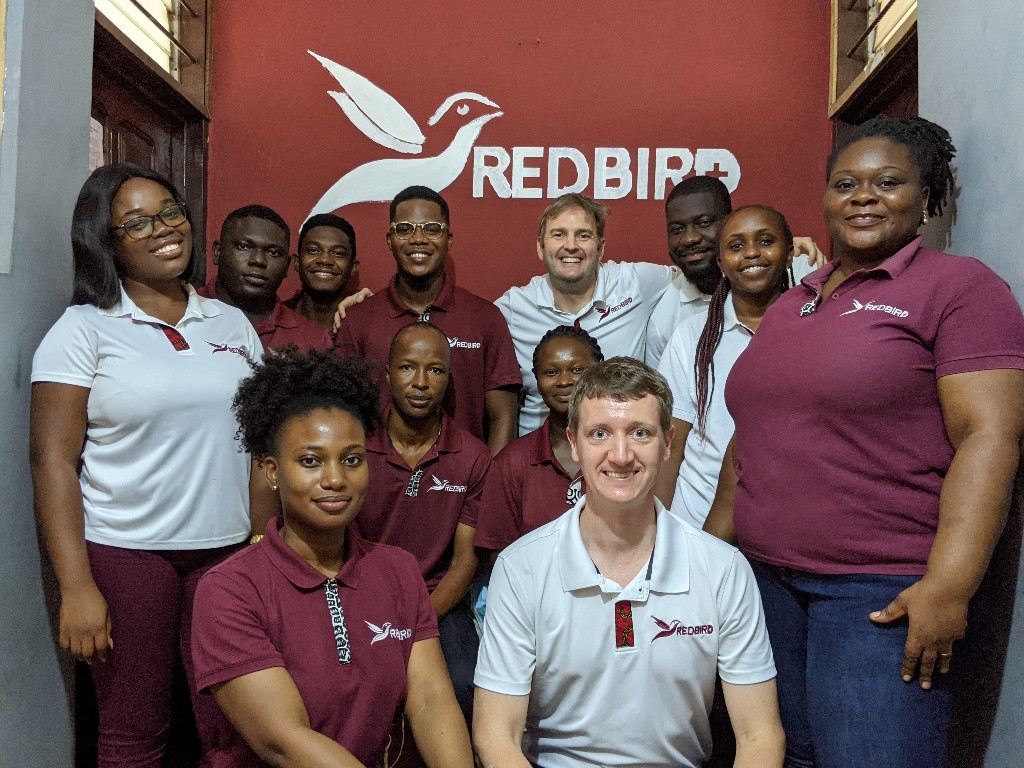For patients and healthcare professionals to properly track and manage illnesses, especially chronic ones, healthcare needs to be decentralized. It also needs to be more convenient, with a patient’s health information able to follow them wherever they go.
Redbird, a Ghanaian health tech startup that allows easy access to convenient testing and ensures that doctors and patients can view the details of those test results at any time, announced today that it has raised a $1.5 million seed investment.
Investors who participated in the round include Johnson & Johnson Foundation, Newton Partners (via the Imperial Venture Fund) and Founders Factory Africa. This brings the company’s total amount raised to date to $2.5 million.
The health tech company was launched in 2018 by Patrick Beattie, Andrew Quao and Edward Grandstaff. As a founding scientist at a medical diagnostics startup in Boston, Beattie’s job was to develop new rapid diagnostic tests. During his time in Accra in 2016, he met Quao, a trained pharmacist in Ghana at a hackathon whereupon talking found out that their interests in medical testing overlapped.
Beattie told TechCrunch that while he saw many exciting new tests in development in the U.S., he didn’t see the same in Ghana. Quao, who is familiar with how Ghanaians use pharmacies as their primary healthcare point, felt perturbed that these pharmacies weren’t doing more than transactional purchases.
Rising African venture investment powers fintech, clean tech bets in 2020
They both settled that pharmacies in Ghana needed to imbibe the world of medical testing. Although both didn’t have a tech background, they realized technology was necessary to execute this. So, they enlisted the help of Grandstaff to be CTO of Redbird while Beattie and Quao became CEO and COO, respectively.

Redbird enables pharmacies in Ghana to add to their pharmacy services rapid diagnostic testing for 10 different health conditions. These tests include anaemia, blood sugar, blood pressure, BMI, cholesterol, Hepatitis B, malaria, typhoid, prostate cancer screening and pregnancy.
Also, Redbird provides pharmacies with the necessary equipment, supplies and software to make this possible. The software — Redbird Health Monitoring — is networked across all partner pharmacies and enables patients to build medical testing records after going through five-minute medical tests offered through these pharmacies.
Rather than employing a SaaS model that Beattie says is not well appreciated by its customers, Redbird’s revenue model is based on the supply of disposable test strips.
“Pharmacies who partner with Redbird gain access to the software and all the ways Redbird supports our partners for free as long as they purchase the consumables through us. This aligns our revenue with their success, which is aligned with patient usage,” said the CEO.
This model is being used with more than 360 pharmacies in Ghana, mainly in Accra and Kumasi. It was half this number in 2019, which Redbird has since doubled despite the pandemic. These pharmacies have recorded over 125,000 tests in the past three years from more than 35,000 patients registered on the platform.
Redbird will use the seed investment to grow its operations within Ghana and expand to new markets that remain undisclosed.
In 2018, Redbird participated in the Alchemist Accelerator just a few months before launch. It was the second African startup after fellow Ghanaian health tech startup mPharma to take part in the six-month program. The company also got into Founders Factory Africa last April.
Ghana’s mPharma partners with Ethiopian conglomerate to enter its eighth market
According to Beattie, most of the disease burden Africans might experience in the future will be chronic diseases. For instance, diabetes is projected to grow by 156% over the next 25 years. This is why he sees decentralized, digitized healthcare as the next leapfrog opportunity for sub-Saharan Africa.
“Chronic disease is exploding and with it, patients require much more frequent interaction with the healthcare system. The burden of chronic disease will make a health system that is highly centralized impossible,” he said. “Like previous leapfrog events, this momentum is happening all over the world, not just in Africa. Still, the state of the current infrastructure means that healthcare systems here will be forced to innovate and adapt before health systems elsewhere are forced to, and therein lies the opportunity,” he said.
But while the promise of technology and data is exciting, it’s important to realize that health tech only provides value if it matches patient behaviors and preferences. It doesn’t really matter what amazing improvements you can realize with data if you can’t build the data asset and offer a service that patients actually value.
Beattie knows this all too well and says Redbird respects these preferences. For him, the next course of action will be to play a larger role in the world’s developing ecosystem where healthcare systems build decentralised networks and move closer to the average patient.
Healthcare by 2028 will be doctor-directed, patient-owned and powered by visual technologies
This decentralised approach is what attracted U.S. and South African early-stage VC firm Newtown Partners to cut a check. Speaking on behalf of the firm, Llew Claasen, the managing partner, had this to say.
“We’re excited about Redbird’s decentralised business model that enables rapid diagnostic testing at the point of primary care in local community pharmacies. Redbird’s digital health record platform has the potential to drive significant value to the broader healthcare value chain and is a vital step toward improving healthcare outcomes in Africa. We look forward to supporting the team as they prove out their business model and scale across the African continent.”
Early Stage is the premier “how-to” event for startup entrepreneurs and investors. You’ll hear firsthand how some of the most successful founders and VCs build their businesses, raise money and manage their portfolios. We’ll cover every aspect of company building: Fundraising, recruiting, sales, product-market fit, PR, marketing and brand building. Each session also has audience participation built-in — there’s ample time included for audience questions and discussion. Use code “TCARTICLE” at checkout to get 20% off tickets right here.































Comment